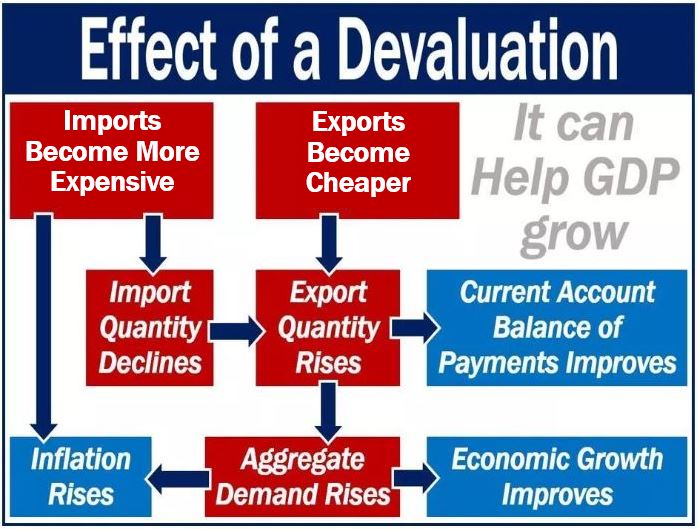What is a devaluation? Definition and examples
A Devaluation occurs when the official value of a currency declines in relation to other currencies. We use the term when the decline is forced. In other words, the authorities planned it. A devaluation is also the underestimation or reduction of the importance or worth of something.
The verb ‘to devalue‘ means to reduce the official value of a currency in relation to a basket of currencies. The verb also means to underestimate or reduce the importance or worth of something. For example, somebody might say: “Jenny resented the way Tom seemed to devalue her achievement.”
This article focuses on the meaning of the term when we use it in a financial context. In other words, when we are talking about currencies.
The Cambridge Dictionary has the following definition of devaluation:
“1. The action of reducing the rate at which money can be exchanged for foreign money. 2. The action of causing someone or something to be considered less valuable or important.”
The opposite of a devaluation is a revaluation.

Devaluation vs. depreciation
Do not confuse the term with depreciation. Depreciation refers to a decline in a currency’s market value without any formal adjustments of its exchange rate. In other words, the government did not force it to happen.
If a country has a free-floating currency, it cannot devalue. Instead, it appreciates and depreciates.
Depreciation occurs when market forces, i.e., the forces of supply and demand, cause a free-floating currency to decline in value.
Devaluation can only occur if the government makes it happen, i.e., sets the currency to a new, lower value. You can only devalue a currency that has a fixed exchange rate – one that does not ‘float.’
The British pound, US dollar, Japanese yen, and euro are floating currencies. Market forces determine their value.
The Saudi riyal and Venezuelan Bolivar, on the other hand, are fixed currencies. The Saudi or Venezuelan governments set their value.
Therefore, a devaluation of the pound, dollar, or euro is not possible. However, it is possible for the riyal and bolivar.
Effects of a devaluation
Following a devaluation, the currency’s new lower value will make exports cheaper for foreign purchasers. Conversely, imports will become more expensive for citizens of the country whose currency devalued.
If the country needs to boost exports, a devaluation may be welcomed, especially by businesses that sell many of their goods abroad.
If the government mishandles the devaluation of its currency, it could end up with hyperinflation, i.e., an extremely high inflation rate.
A devaluation can also make the servicing of foreign debt more costly, as it requires more of the devalued currency to meet the same obligations in foreign currencies.
Vocabulary and concepts
There are many compound nouns containing the word “devaluation” in the English language. Let’s take a look at some of them, their meanings, and how we can use them in a sentence:
- Devaluation rate – the specific amount by which a currency is devalued.
Example: “The government’s announcement of the devaluation rate sent shockwaves through the financial markets.” - Devaluation impact – the effect that devaluation has on an economy.
Example: “Economists are studying the devaluation impact on import prices.” - Devaluation policy – a strategic decision by a country’s monetary authority to devalue its currency.
Example: “The central bank is considering a devaluation policy to correct the trade deficit.” - Devaluation trend – a pattern of repeated devaluation over a period of time.
Example: “The recurring devaluation trend has investors worried about the long-term stability of the currency.” - Devaluation risk – the possibility that a currency will decrease in value against other currencies.
Example: “International traders have to account for devaluation risk in their contracts.” - Devaluation effect – the outcome or result of a currency’s devaluation.
Example: “The devaluation effect was immediately felt in the tourism industry, as travel to the country became more affordable.”
Video – What is a Devaluation?
This educational video, from our sister channel on YouTube – Marketing Business Network, explains what a ‘Devaluation’ is using simple and easy-to-understand language and examples.

